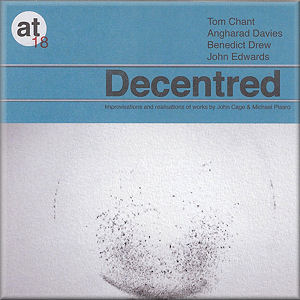 |
 |
|

Availability
CD: Another
Timbre
|
Decentred
Michael PISARO (b.1961)
‘Reader, listen: harmony series no.10’ (2004) [6:32]
Based on "The Substantive" by William Bronk (violin and
contrabass)
Activation (improvisation) [10:38]
John CAGE (1912-1992)
‘Four 6 ’ (1992) [30:05]
Michael PISARO
‘La voix qui dit; Harmony series no. 8d’ [4:50]
Based on "La Voix qui Dit" by Samuel Beckett (violin and
bass clarinet)
Decentring (improvisation) [13:15]
Michael PISARO
‘Flux: harmony series, no.8a’ [3:12]
Based
on "Flux" by Samuel Beckett (contrabass and electronics)
 Tom
Chant (saxophones & bass clarinet) Tom
Chant (saxophones & bass clarinet)
Angharad Davies (violin & objects)
Benedict Drew (electronics & objects)
John Edwards (double bass)
rec. 4 January 2009, St James’ Church, Friern Barnet, North
London.
 ANOTHER TIMBRE AT18 [69:07]
ANOTHER TIMBRE AT18 [69:07]  |
|
|
I think how you respond to this disc will depend on what mood you are in. If you are in the mood for some free improvisation, and the timeless span of one of John Cage’s late number pieces, then you will find some interesting material in this recording.
My anticipatory frame of mind was however dampened from the start by the work of Michael Pisaro. I know it’s not good form to make negative comments on another composer’s work, and I have read that Mr. Pisaro is much acclaimed and is doing very well for himself, but on the strength of this disc I shall avoid spending money on any concert tickets. The first two of the pieces here are empty spaces filled with what sound like more or less random, more or less sustained notes. The brief booklet text confirms this suspicion: “The number of players is usually specified, but instrumentation is left loose... Similarly, particular notes are not specified, though there may be indications for general duration, amplitude and register.” I’m up for anything - minimal, improvised, free instrumentation, zen silences and pure sound, but this is something I’d thought we might have grown out of by now. Flux has a few breathy electronic noises which arouse marginal interest, much as one might look upwards on hearing a blowtorch at work on a tar roof, or how a hot air balloon stuck outside your 20th floor window might wake you on a windless Sunday morning, but otherwise the sustained notes of these pieces do nothing whatsoever for me. The best part is being able to hear some traffic noise in the distance between puffs and scrapes. I am sure the musician’s commitment is of the highest level and I am sure they will believe I am missing the point, but my opinion is that everyone’s time is being wasted. Pisaro’s ‘Harmony Series’ claim to be translations of poetry into music, but while the composer might seem to need this crutch, the poetry most certainly doesn’t need this composer.
The performers on this recording clearly have an affinity, and improvise well. The curse of painful electronic sine-waves and high pitched scraping unfortunately crops up to annoy the headphone listener in the eponymous Decentring, but the sound of spontaneous invention in the improvisations is always one which intrigues, albeit more as a live sport than for repeated listening.
John Cage’s Four 6 is dedicated to Pauline Oliveros to celebrate her sixtieth birthday and for Joan La Barbara, William Winant and Leonard Stein who joined Cage for the premiere performance. The score’s instruction is akin to many of the other number pieces: “The performers choose twelve different sounds each, with fixed amplitude, overtone structure etc., and play within the flexible time brackets.” These specifications might lead you to expect something as dubious as Pisaro’s pieces, but Cage was an old master in this field and knew how to manage freedom against uncompromising demands and a strict framework. Silence is or should be an important factor, and the layering of sounds results in a kind of antique counterpoint transposed onto the ‘modern’ concepts of sound as an absolute, and the connectivity of the musicians to this concept - the idea of bringing the sounds of a chaotic world into the controlled environment of a concert or recording. My only problem with this particular recording is with some of the sound palette selected. I retain an annoyance with those wretched high pitched electronic whines, the irritation with which may mean nothing more than that me and my cat are getting too old for this kind of thing. I also however maintain that, while there are some nice nuances on this recording, there is also a missed opportunity. We’ve done the scraped strings, multiphonics, scratchy or rumbly electronics and singing bowls to death already in this field, and I would be really intrigued to hear some new directions in terms of sound - particularly for Cage’s number pieces, since they offer such a rich opportunity for experimentation within a disciplined framework.
I have no doubts in the integrity of the musicians on this well recorded disc, and wish them well. The kind of music here is not one with universal appeal, though I would be the first to exhort people to broaden their horizons and take a good look at improvised music. I have done a certain amount of working in this field, enjoy it greatly and take it very seriously, and have the greatest of respect for the musicians and other creative people who pioneer fascinating work in all kinds of improvisational idiom. Creating an atmosphere with a few sparse notes is a valid means of expression, but I am afraid my patience is tested to the limits by certain aspects of this release. On the whole, this is an interesting programme, though unfortunately lumbered with the heavy pretensions of the ‘Harmony series’, a misnomer if ever there was one.
Dominy Clements
|
|




 All Nimbus reviews
All Nimbus reviews








